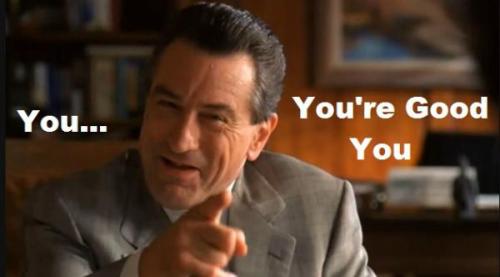The Paul Krugman Blog - Rationality of the Euro

These comments reflect more on economics and thought-process rather than markets, however that is what defines the markets when all is said and done.
Britain was certainly on the right track when it decided not to participate in the European experiment. And it remains shocking that Poland is seeking membership in this club, given the mess and clear failure of this project. What is it about Polish people? There is something that we just do not understand. All we can say, is that too often we give up long-term advantages, in order to remedy a short-term problem.
Why did the Brits decide not to join the club - by gosh, as Paul sarcastically notes in his New York tone, they did some "analysis." No one else apparently does? This point, in itself, raises some fascinating considerations when in comes to expressions such as: "they did their homework," "paralysis through analysis" analysed to death" and so on, and so forth. In fact, just writing about it makes one wonder and come to believe that analysis is much more perpetual in motion than stoic; as new ideas, devices, facts and knowledge is brought to the awareness of our cognitive processes. Particularly, for complex situations where the deterministic and subjective variables are always in a dynamic state of change, with the possibility of even two opposites co-existing as truths at the same or different times. Go figure - the movie never ends !
So you see there is enough material here to write at least ten, five hundred page, books about the analysis of analysis. What is the right amount? the right tools? the right perspective? Or how about analyzing the initial diagnostics and its tools - if its wrong, then so should be the supporting analysis. Then, there are the assumptions and we can assume that most people have different ones - or can we? The point being, do we ever really know if we are doing the most relevant diagnosis, analysis and evaluation of goal, facts and constraints leading to the optimal solution for a moment or forever? I have a funny feeling that such knowledge is impossible to attain, except for those who command the arrogance to think otherwise.Why? Because they know, they know everything.
In the end, this is a "very serious" topic and process, as it defines the fate of individuals, economies, businesses and our species in so many other ways. The case of Britain, supposedly doing the right analysis once, contrasts with years of bad analysis, that saw their Empire rise and fall, from being a political, economic and military powerhouse, to what it is today, and the tomorrows to come. Should we blame it on the analysis?
Probably, but you may never know for sure!
First Financial Insights
July 6, 2012

These comments reflect more on economics and thought-process rather than markets, however that is what defines the markets when all is said and done.
Britain was certainly on the right track when it decided not to participate in the European experiment. And it remains shocking that Poland is seeking membership in this club, given the mess and clear failure of this project. What is it about Polish people? There is something that we just do not understand. All we can say, is that too often we give up long-term advantages, in order to remedy a short-term problem.
Why did the Brits decide not to join the club - by gosh, as Paul sarcastically notes in his New York tone, they did some "analysis." No one else apparently does? This point, in itself, raises some fascinating considerations when in comes to expressions such as: "they did their homework," "paralysis through analysis" analysed to death" and so on, and so forth. In fact, just writing about it makes one wonder and come to believe that analysis is much more perpetual in motion than stoic; as new ideas, devices, facts and knowledge is brought to the awareness of our cognitive processes. Particularly, for complex situations where the deterministic and subjective variables are always in a dynamic state of change, with the possibility of even two opposites co-existing as truths at the same or different times. Go figure - the movie never ends !
So you see there is enough material here to write at least ten, five hundred page, books about the analysis of analysis. What is the right amount? the right tools? the right perspective? Or how about analyzing the initial diagnostics and its tools - if its wrong, then so should be the supporting analysis. Then, there are the assumptions and we can assume that most people have different ones - or can we? The point being, do we ever really know if we are doing the most relevant diagnosis, analysis and evaluation of goal, facts and constraints leading to the optimal solution for a moment or forever? I have a funny feeling that such knowledge is impossible to attain, except for those who command the arrogance to think otherwise.Why? Because they know, they know everything.
In the end, this is a "very serious" topic and process, as it defines the fate of individuals, economies, businesses and our species in so many other ways. The case of Britain, supposedly doing the right analysis once, contrasts with years of bad analysis, that saw their Empire rise and fall, from being a political, economic and military powerhouse, to what it is today, and the tomorrows to come. Should we blame it on the analysis?
Probably, but you may never know for sure!
First Financial Insights
July 6, 2012
New Yorkers, eh!
ANALYZE THIS BUDDY !

